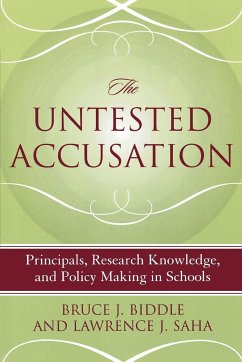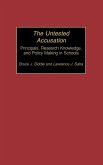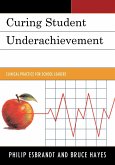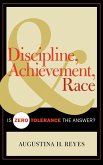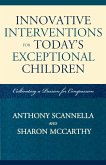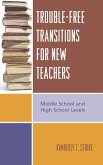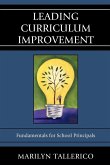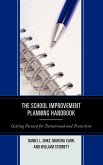Bruce J. Biddle, Lawrence J. Saha
Untested Accusation
Principals, Research Knowledge, and Policy Making in Schools
Bruce J. Biddle, Lawrence J. Saha
Untested Accusation
Principals, Research Knowledge, and Policy Making in Schools
- Broschiertes Buch
- Merkliste
- Auf die Merkliste
- Bewerten Bewerten
- Teilen
- Produkt teilen
- Produkterinnerung
- Produkterinnerung
Here, the authors address questions about the utilization of knowledge from social research and offer evidence that challenges allegations about the 'awful reputation' of educational research and its supposed lack of impact.
Andere Kunden interessierten sich auch für
![The Untested Accusation The Untested Accusation]() Bruce J. BiddleThe Untested Accusation88,99 €
Bruce J. BiddleThe Untested Accusation88,99 €![Curing Student Underachievement Curing Student Underachievement]() Philip EsbrandtCuring Student Underachievement61,99 €
Philip EsbrandtCuring Student Underachievement61,99 €![Discipline, Achievement, and Race Discipline, Achievement, and Race]() Augustina H. ReyesDiscipline, Achievement, and Race92,99 €
Augustina H. ReyesDiscipline, Achievement, and Race92,99 €![Innovative Interventions for Today's Exceptional Children Innovative Interventions for Today's Exceptional Children]() Anthony ScannellaInnovative Interventions for Today's Exceptional Children34,99 €
Anthony ScannellaInnovative Interventions for Today's Exceptional Children34,99 €![Trouble-Free Transitions for New Teachers Trouble-Free Transitions for New Teachers]() Kimberly T. StrikeTrouble-Free Transitions for New Teachers36,99 €
Kimberly T. StrikeTrouble-Free Transitions for New Teachers36,99 €![Leading Curriculum Improvement Leading Curriculum Improvement]() Marilyn TallericoLeading Curriculum Improvement36,99 €
Marilyn TallericoLeading Curriculum Improvement36,99 €![School Improvement Planning Handbook School Improvement Planning Handbook]() Daniel L. DukeSchool Improvement Planning Handbook91,99 €
Daniel L. DukeSchool Improvement Planning Handbook91,99 €-
-
-
Here, the authors address questions about the utilization of knowledge from social research and offer evidence that challenges allegations about the 'awful reputation' of educational research and its supposed lack of impact.
Produktdetails
- Produktdetails
- Verlag: R&L Education
- Seitenzahl: 320
- Erscheinungstermin: 28. Januar 2005
- Englisch
- Abmessung: 229mm x 152mm x 19mm
- Gewicht: 522g
- ISBN-13: 9781578861934
- ISBN-10: 1578861934
- Artikelnr.: 25420802
- Herstellerkennzeichnung
- Libri GmbH
- Europaallee 1
- 36244 Bad Hersfeld
- gpsr@libri.de
- Verlag: R&L Education
- Seitenzahl: 320
- Erscheinungstermin: 28. Januar 2005
- Englisch
- Abmessung: 229mm x 152mm x 19mm
- Gewicht: 522g
- ISBN-13: 9781578861934
- ISBN-10: 1578861934
- Artikelnr.: 25420802
- Herstellerkennzeichnung
- Libri GmbH
- Europaallee 1
- 36244 Bad Hersfeld
- gpsr@libri.de
Bruce J. Biddle is a social psychologist and a professor emeritus at the University of Missouri, Columbia, Missouri. A former director of a research center, founding editor of a major journal, and frequent visitor to other campuses (particularly in Australia), his research and scholarship have centered on role theory, the role of the teacher, classroom interaction, youth decision making, the impact of research on social policy, the misuse of research knowledge by advocates, and youth poverty and its impact within education. Larry J. Saha is a sociologist and a reader at the Australian National University, Canberra, ACT, Australia. A former departmental chair, former Dean of his College, current editor of a major journal, and frequent visitor to other campuses (particularly in the United States and Sweden), his research and scholarship have centered on the sociology of education, social change and development, rural and urban community life, attitudes and motivation, and collective behavior.
Part 1 Tables and Figures
Part 2 Preface
Chapter 3 Chapter One: Does Research on Education Have an Impact?
Chapter 4 Chapter Two: Thinking Out the Problem
Chapter 5 Chapter Three: A Design for Investigation
Chapter 6 Chapter Four: Principals' Exposure to Knowledge Sources
Chapter 7 Chapter Five: Principals' Opinions About Research and Innovation
Chapter 8 Chapter Six: Research Knowledge That Principals Volunteer
Chapter 9 Chapter Seven: Research Knowledge That Principals Recognize
Chapter 10 Chapter Eight: Principals' Reported Use of Research Knowledge
Chapter 11 Chapter Nine: Findings, Conclusions, and Implications
Part 12 Appendices
Chapter 13 A.1: Interview Schedule
Chapter 14 A.2: Interview Schedule Supplement
Chapter 15 A.3: List A: Types of Information Sources for Technical
Knowledge
Chapter 16 A.4: List B: Examples of Research-Generated Knowledge
Chapter 17 B.1: Supplementary Questionnaire [American Version]
Chapter 18 B.2: Supplementary Questionnaire [Australian Version]
Part 19 References
Part 20 Name Index
Part 21 Subject Index
Part 2 Preface
Chapter 3 Chapter One: Does Research on Education Have an Impact?
Chapter 4 Chapter Two: Thinking Out the Problem
Chapter 5 Chapter Three: A Design for Investigation
Chapter 6 Chapter Four: Principals' Exposure to Knowledge Sources
Chapter 7 Chapter Five: Principals' Opinions About Research and Innovation
Chapter 8 Chapter Six: Research Knowledge That Principals Volunteer
Chapter 9 Chapter Seven: Research Knowledge That Principals Recognize
Chapter 10 Chapter Eight: Principals' Reported Use of Research Knowledge
Chapter 11 Chapter Nine: Findings, Conclusions, and Implications
Part 12 Appendices
Chapter 13 A.1: Interview Schedule
Chapter 14 A.2: Interview Schedule Supplement
Chapter 15 A.3: List A: Types of Information Sources for Technical
Knowledge
Chapter 16 A.4: List B: Examples of Research-Generated Knowledge
Chapter 17 B.1: Supplementary Questionnaire [American Version]
Chapter 18 B.2: Supplementary Questionnaire [Australian Version]
Part 19 References
Part 20 Name Index
Part 21 Subject Index
Part 1 Tables and Figures
Part 2 Preface
Chapter 3 Chapter One: Does Research on Education Have an Impact?
Chapter 4 Chapter Two: Thinking Out the Problem
Chapter 5 Chapter Three: A Design for Investigation
Chapter 6 Chapter Four: Principals' Exposure to Knowledge Sources
Chapter 7 Chapter Five: Principals' Opinions About Research and Innovation
Chapter 8 Chapter Six: Research Knowledge That Principals Volunteer
Chapter 9 Chapter Seven: Research Knowledge That Principals Recognize
Chapter 10 Chapter Eight: Principals' Reported Use of Research Knowledge
Chapter 11 Chapter Nine: Findings, Conclusions, and Implications
Part 12 Appendices
Chapter 13 A.1: Interview Schedule
Chapter 14 A.2: Interview Schedule Supplement
Chapter 15 A.3: List A: Types of Information Sources for Technical
Knowledge
Chapter 16 A.4: List B: Examples of Research-Generated Knowledge
Chapter 17 B.1: Supplementary Questionnaire [American Version]
Chapter 18 B.2: Supplementary Questionnaire [Australian Version]
Part 19 References
Part 20 Name Index
Part 21 Subject Index
Part 2 Preface
Chapter 3 Chapter One: Does Research on Education Have an Impact?
Chapter 4 Chapter Two: Thinking Out the Problem
Chapter 5 Chapter Three: A Design for Investigation
Chapter 6 Chapter Four: Principals' Exposure to Knowledge Sources
Chapter 7 Chapter Five: Principals' Opinions About Research and Innovation
Chapter 8 Chapter Six: Research Knowledge That Principals Volunteer
Chapter 9 Chapter Seven: Research Knowledge That Principals Recognize
Chapter 10 Chapter Eight: Principals' Reported Use of Research Knowledge
Chapter 11 Chapter Nine: Findings, Conclusions, and Implications
Part 12 Appendices
Chapter 13 A.1: Interview Schedule
Chapter 14 A.2: Interview Schedule Supplement
Chapter 15 A.3: List A: Types of Information Sources for Technical
Knowledge
Chapter 16 A.4: List B: Examples of Research-Generated Knowledge
Chapter 17 B.1: Supplementary Questionnaire [American Version]
Chapter 18 B.2: Supplementary Questionnaire [Australian Version]
Part 19 References
Part 20 Name Index
Part 21 Subject Index

